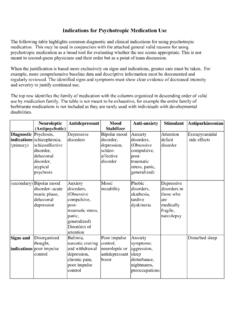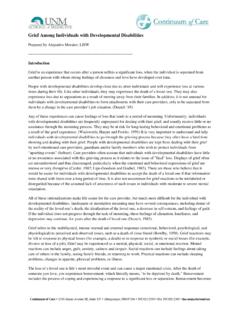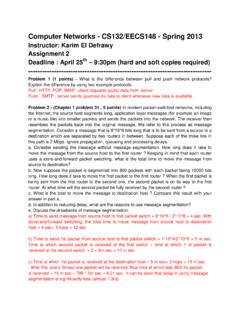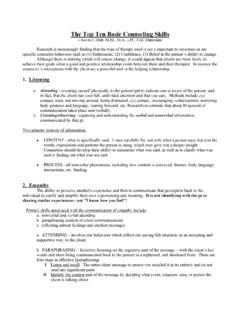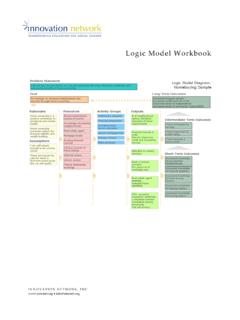Transcription of GUIDELINES: Management of Client Refusal to Take …
1 These guidelines where developed by Continuum of Care at the University of New Mexico Health Sciences Center under a Joint Powers Agreement with the New Mexico Department of Health Developmental Disabilities Support Division. They have reviewed and approved by the Quality Assurance Sub-committee of the Adult Services Task Force as of 10/95. For more information please contact Continuum of Care at 505-925-2350. GUIDELINES: Management of Client Refusal to Take Prescribed medication Introduction These guidelines are intended to help community based programs serving individuals with developmental disabilities obtain a balance between respecting each individual s right to refuse medication and assuring health and safety. This balance is often difficult to achieve given the complexity of individual situations so it is very important to communicate clearly with physicians and pharmacists regarding these matters.
2 Prevention Strategies Programs should have the following information regarding all medications being taken by all individuals served, whether or not there has been a history of Refusal . Remember, Refusal is not the only reason that a dose might be missed. These questions should be asked each time a new medication is prescribed and staff should ask the physician or pharmacist to also explain this information directly to the individual regardless of their ability to communicate. 1. What are the implications if the individual misses a dose of this medication ? What will result if they miss several doses? (For some drugs the implications are very serious, for others, no cause for alarm.) 2. At what point should the program contact the physician due to missed doses? ( after one, three the same day, ten in one month or if certain symptoms return, ) 3. What are the acceptable time frames for getting the individual to take their medication ?
3 For example, can you still give it to them more than an hour after the dosage time? Is it important that doses be a certain period of time apart ( no tow does any closer together than four hours)? (It is especially important to ask about time frames for giving anticonvulsant, psychotropic or antibiotic medication ; ask if you can give two doses together if one is missed. If yes, ask if the evening is the best time to do this.) Other Tips: Be upbeat when approaching the individuals about taking their medication . State in a matter of fact way It s time to take your medicine rather than Do you want to take you medicine? . These guidelines where developed by Continuum of Care at the University of New Mexico Health Sciences Center under a Joint Powers Agreement with the New Mexico Department of Health Developmental Disabilities Support Division. They have reviewed and approved by the Quality Assurance Sub-committee of the Adult Services Task Force as of 10/95.
4 For more information please contact Continuum of Care at 505-925-2350. Intervention for Occasional Refusal 1. Ask them WHY they don t want to take it! This is very important because for some individuals, Refusal is their way of letting you know that the medication has negative side effects such as nervousness, nausea, drowsiness, bad taste ect. In one case an individual refused because another staff person had just given him his medication but failed to document the dose; he prevented an overdose. For individuals who have limited communication skills you may need to be very observant to determine why they are refusing; look for patterns in time of dose ( are you interrupting a favorite activity?), location, particular staff ( does the individual only refuse on Bobby s shift ?), gestures and body language. If you can determine WHY they won t take the medication , alternatives may become clear.
5 For example if they don t like the taste, maybe a breath mint afterwards, or a spoon of pudding would solve the problem . If the medication makes them feel bad in some way, alternatives could be discussed with the physician. 2. Find out if they understand what the medication is for. If they do not understand, remind them of the purpose and ask them again to take it. 3. Find out if they understand the implications of not taking there medication (which you found out from the physician or pharmacist as suggested). If they do not understand, remind them of the implications and ask them again to take it (In addition to physical symptoms, implications may include the need to call the physician and report the missed dose.) 4. Wait a short time, and then encourage them again before the acceptable time frame expires. Generally the time frame is one hour unless the physician gave more specific instructions.
6 5. If they continue to refuse, document the missed dose and state the reason (individual refused), along with other relevant information if known ( they indicated nausea). In addition, contact the physician under circumstances as agreed when medication was prescribed and/or implement any steps in the ISP for missed doses. Other Tips: Be very matter of fact in your communication style with the individual taking the medication . Do not beg, threaten, bribe or force the individual. Do not say I ll get in trouble or You ll get in trouble . These guidelines where developed by Continuum of Care at the University of New Mexico Health Sciences Center under a Joint Powers Agreement with the New Mexico Department of Health Developmental Disabilities Support Division. They have reviewed and approved by the Quality Assurance Sub-committee of the Adult Services Task Force as of 10/95. For more information please contact Continuum of Care at 505-925-2350.
7 Frequent or Persistent Patter of Refusal If the above strategies have not been successful, and the implications of missed doses jeopardize the individual s health, the Interdisciplinary Team should meet to: 1. Collect and document observations and knowledge of the reason the individual continues to refuse the medication . (Consdier physical as well as behavioral barriers because maybe they have trouble swallowing the medicine.) 2. Collect and document strategies that have already been tried. 3. Identify questions for the physician. ( Are there alternative medications to treat the condition in terms of type, route, amount, schedule, ect. What are the health implications of continued missed doses and/or discontinuation of treatment? Are there ways to alleviate negative side effects?) 4. If the implications of continued missed doses and/or discontinued treatment will jeopardize the individuals health, the team should clarify the guardianship status of the individual, determine if it covers treatment decisions, and consider if a change in status should be pursued.
8 It may be a good idea to consider other legal ramifications for the individual, service provider and others. 5. Consider various alternatives to address the situation, for example Changes to medication regimen Changes in approach with the individual Taking the medication in food (without hiding it!) Patient education Incentives for cooperation Referral to a specialist Nursing services Consultation from an OT, SLP and/or Dietician 6. Always include a protocol for what the staff should do if refusals continue to occur which should be work out with the physician. These guidelines where developed by Continuum of Care at the University of New Mexico Health Sciences Center under a Joint Powers Agreement with the New Mexico Department of Health Developmental Disabilities Support Division. They have reviewed and approved by the Quality Assurance Sub-committee of the Adult Services Task Force as of 10/95.
9 For more information please contact Continuum of Care at 505-925-2350. Other Tips: Invite the physician to attend so that all the alternatives can be reviewed at the meeting. Even if they can only participate by phone it is helpful. If the physician is not able to attend, a team member should discuss the groups questions with the physician before final decisions are made. Perhaps if the physician is provided questions ahead of time, he could send a nurse or other representative with the information. If the physician is not responsive to the teams concerns, consider gaining a second opinion. GUIDELINES: Management of Client Refusal to Take Prescribed medication Other medical concerns Other medically related situations may arise which the team should meet to address. For example if the individual refuses to cooperate with lab tests (especially blood level checks), refuses to keep doctor s/dentist s appointments, are accessing multiple physicians in order to gain extra medication due to a substance abuse problem , or because existing treatment has not been successful in controlling their condition ( diabetes, seizures, ect.)
10 The team process listed above is relevant for these types of situations as well.
